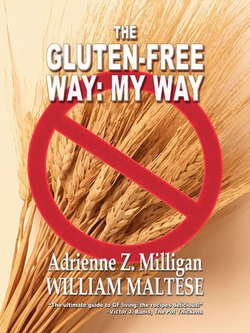Читать книгу The Gluten-Free Way: My Way - William Maltese - Страница 13
На сайте Литреса книга снята с продажи.
ОглавлениеCHAPTER THREE
Jonathan’s Story
My wife, Adrienne, asked me to put down my memories of how my family self-diagnosed our problems with wheat and what we did to deal with them.
It started when I was just beginning the third or fourth grade. For some time, my father thought I had an allergy to wheat and my mother thought he was simply crazy. My parents started me on a regiment of Sudafed® to control the coughing fits that I was experiencing. I was also experiencing uncontrollable headaches, mood swings, inability to concentrate, difficulty in school, etc. One Saturday for some reason I didn’t have anything with wheat in it all day. For dinner, my mother made whole wheat pancakes. My father made the offhand comment, “What do you want to bet he’ll be coughing his head off in a couple of minutes?” Within a few minutes, I was clearing my throat. The next day, a simple change in diet made my headache and cough go away. This began a journey of self-diagnosis, and guessing by my mother, to find out what was wrong with the family.
The first thing that we did was to stop feeding me anything with wheat in it. We didn’t understand until almost twenty years later that the culprit was truly gluten. The changes we did make were to replace everything I ate that contained wheat with either corn- or rye-based foods. I remember my peanut-butter-and-jelly sandwiches where made on hard rye crackers. We later replaced these with a wheat-free rye bread that was much more palatable. This diet change helped with the coughing and the headaches to some extent but still didn’t remedy them.
I had a difficult time with my brother and was always physically fighting with him. One hot sticky summer night, while I was on the top bed of our bunk beds, my brother would not stop clearing his throat. I remember not being able to control my anger and just losing control. I climbed down off of the top bunk and punched him in the stomach, then climbed back into my bunk to wait for my parents to come and discipline me. This typifies the uncontrollable mood swings that came over me when I ate gluten.
A year after going off wheat, we switched to goat’s milk and started to avoid things made with cow’s milk, because of the stomach pains and issues that my brother and I were having. These stomach issues continued for years. My brother and I had gastrointestinal-tract tests done that required us to drink barium and water and then have X-rays taken to try and find out what was wrong with us; of course, they didn’t reveal anything. Finally, we were told that we were lactose intolerant and to avoid milk products. This was about the time I was in seventh grade.
During High School, I would self-regulate my wheat intake based on how I wanted to handle the symptoms of my “allergy” and its associated problems. If I knew a party was coming up, or a camp-out, I could base how I’d feel by how much wheat I ate. Also during high school, my mother was diagnosed with irritable-bowel syndrome.
At some time in my early twenties, I heard somewhere that my problem was most likely related to the protein in wheat, rye, and barley which is gluten. I started to realize that even the rye I was eating would cause the headaches and the mood swings; I just needed to eat it in larger quantities than wheat for it to affect me. I decided that I would stop messing with the rye and “manage” my wheat intake. I got to the point where I could identify in less than five minutes if I had anything with wheat in it. My best friend called me a hypochondriac because I was always complaining of not feeling well. I was easily depressed. My stomach problems kept me from ever thinking of drinking milk, and I rarely ate cheese or ice cream. I would have the stomach cramps even if I didn’t have milk products, and I would think I must have had milk somewhere. I also recall that I referred to wheat as “my addiction.” I would get a “high” off of eating it, and would have to continue to eat it to continue the high. When I would stop eating it, I would go through withdrawal symptoms of sorts. The cravings were intense and sometimes uncontrollable and, once I started eating it, again, I would eat it for days on end until I would feel so horrible that I would (eventually) have to stop.
How grateful I am that all of that has changed since my family embarked upon the 100% Gluten-Free Way, especially since having come to realize that my problem is gluten, not lactose, allows me to drink milk, eat ice cream, and enjoy cheese, without fearing any of them (as long as they’re GF) as I once did.
